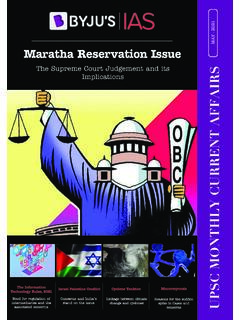Transcription of PART I - tnl-uploads.s3.ap-southeast-1.amazonaws.com
1 PART I. Dear Student, Current affairs are essential for passing the Civil Service Examination's main stage. And we at BYJU'S. IAS are always eager to assist you in scoring high marks at every stage. Thus, we'd like to present our Mains Value Addition Series, which is part of our effort to prepare you to get the most out of this section. This series will be released in two parts. In the first part, we will cover current events from November 2020 to July 2021, and in the second part, we will cover current events from August 2021 to November 2021. Hence, this will thoroughly cover last year's "Current events of national and international importance," for the Civil Services Main Examination 2021.
2 We prepared this series with the demand and evolving nature of CSE in mind, as well as the student's time constraints in studying multiple subjects, revising them, and attempting test series, in mind. Consequently, we have worked hard to keep the series concise while remaining comprehensive in order to meet the demands of the main stage of the Civil Services Examination. We recommend that the student read this series, connect the topics with the static portion, and revise it at least twice before taking the exam. 1 | POLITY AND GOVERNANCE. 2 | POLITY AND GOVERNANCE. CONTENT. Constitutional Provisions and Changes _____ 04-15. Uniform Civil Code (UCC).
3 Indian Secularism Pardoning Power of President and Governor Right to Information Reservation Right to Privacy Disinformation and Freedom of Opinion and Expression - Report by UNHRC. Issues and Challenges in the Federal Structure _____ 16-17. Government of National Capital Territory of Delhi (Amendment) Act (GNCTD), 2021. Disputes Redressal Mechanisms and Institutions _____ 18-33. Issues with the Judiciary Criminal Justice System Tribunal Reforms Anticipatory Bail Online Dispute Resolution Comparison of the Indian Constitutional Scheme with that of other Countries _____ 34-37. Comparison between Indian Constitution and the US. Parliament and State Legislatures _____ 38-39.
4 Declining Scrutiny of Bills by the Parliament Structure, Organization and Functioning of the Executive _____ 40-42. Information Technology (Intermediary Guidelines and Digital Media Ethics Code) Rules, 2021. Pressure Groups and other Associations _____ 43-46. Impact of Foreign Contribution Regulations Act (FCRA) on Non-Government Organisations Internet Shutdowns Elections and Salient Features of the Representation of People's Act _____ 47-49. Voting Rights for NRIs Electoral Bonds Constitutional Bodies _____ 50-52. Election commission of India Statutory, Regulatory and Various Quasi-Judicial Bodies _____ 53-55. Meeting of the Governing Council of NITI Aayog Central Vigilance commission on Integrity Pact 3 | POLITY AND GOVERNANCE.
5 CONSTITUTIONAL PROVISIONS. AND CHANGES 01. Uniform Civil Code (UCC) Indian Secularism Pardoning Power of President and Right to Information Governor Reservation Right to Privacy Disinformation and Freedom of Opinion and Expression - Report by UNHRC. Uniform Civil Code (UCC) Parliament has the power to make laws for the implementation of the Directive Context: Recently, the Delhi High Court in an Principles of State Policy. Also, through order favoured the introduction of the UCC. several judicial pronouncements, the The court observed that the youth of India higher judiciary has favoured UCC in some belonging to varied communities, tribes, castes or the other forms Sarla Mudgal vs or religions who solemnise their marriages Union of India.
6 Needn't to be forced to grapple with issues Protection of Fundamental Rights: The arising because of conflicts in various personal religious or customary personal laws are laws, especially with respect to marriage and biased against the women and minorities divorce. within the religious community. They not only violate the right to life, liberty and What is the Uniform Civil Code? dignity, guaranteed under Article 21 but It is intended towards the formulation of also reinforce patriarchal and stereotypical one law for India. It would be a common notions. law, dealing with matters such as Promotion of unity in diversity: Different marriage, divorce, inheritance, and laws for different religious groups breed adoption of all the religious communities communalism.
7 While protecting diversity, in India. Such a code has been envisaged the UCC would arouse a sense of oneness under Article 44 of the Indian Constitution, and the national spirit. which says that the state shall endeavour to secure a Uniform Civil Code for the citizens Arguments against the Uniform Civil Code throughout the territory of India. (UCC). Ambiguity in the Constitution: According Arguments in Favour of the Uniform Civil to some legal experts, Article 44 uses the Code (UCC) words the state shall endeavour while Simplification of the legal system: As other Articles in the Directive Principles'. multiple laws are governing various chapter use words such as in particular religious communities across the country, strive ; shall, in particular, direct its the legal system in India has become policy ; shall be the obligation of the complex and difficult for the common state etc.
8 Also, Article 43 mentions state person to understand. The UCC can be a shall endeavour by suitable legislation , step towards simplification of this while the phrase by suitable legislation is complex legal system. absent in Article 44. All this implies that the Parliament's authority: Through various duty of the state is greater in other directive SC judgements, it has become clear that principles than in Article 44. 4 | POLITY AND GOVERNANCE. Uniformity already exists to some extent: India is a secular democratic republic with the A uniform code in most civil matters, for freedom of religion at the core of constitutional instance, the Indian Contract Act, Civil values.
9 But the violation of human rights and Procedure Code, Sale of Goods Act, dignity can not be accepted under the name of Transfer of Property Act, Partnership Act, religious practices. Hence, the Uniform Civil Evidence Act, etc, exists. Code (UCC) is imperative, both for the Constitutional framers never intended to protection of the oppressed and for the have UCC across the country: It is argued promotion of national unity and integrity. A. that the framers of the Constitution paid wide debate and discussion of this matter are heed to the diversity existing in the required to clear all the fears and doubts of the country. Hence to avoid uniformity the several communities.
10 Subject of personal law was kept under the concurrent list. Indian Secularism Law commission 's view: In 2018, in a consultation paper, the Law commission Temple Regulation of India concluded that a Uniform Civil Code is neither feasible nor desirable. Context: Recently, the Supreme Court has Diverse laws govern the same religious admitted petitions challenging the community: Diverse laws are governing constitutionality of the Places of Worship the same religious community across the (Special Provisions) Act, 1991. It has sought a country and there's no uniformity within response from the Central Government on it. the same religious community. For example - About the Places of Worship (Special o Until the abrogation of Article 370, Provisions) Act, 1991.











